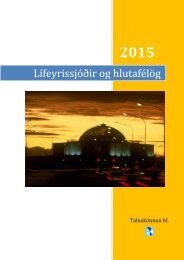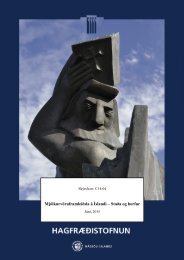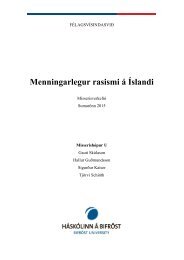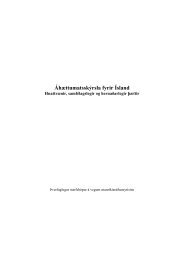Create successful ePaper yourself
Turn your PDF publications into a flip-book with our unique Google optimized e-Paper software.
WORLD REPORT 2016<br />
HUMAN RIGHTS WATCH<br />
Indonesia<br />
President Joko Widodo’s record during his first year in office was mixed. His administration<br />
signaled it would more actively defend the rights of Indonesia’s beleaguered<br />
religious minorities, victimized by both Islamist militants and<br />
discriminatory laws, but made few concrete policy changes. He granted<br />
clemency in May to five of Papua’s political prisoners and released another one<br />
in October, but at time of writing had not freed the approximately 70 Papuans<br />
and 29 Ambonese still imprisoned for peaceful advocacy of independence.<br />
In May, the president—commonly referred to as Jokowi—announced the lifting of<br />
decades-old restrictions on foreign media access to Papua but then did not follow<br />
through, allowing senior government officials to effectively defy the new policy<br />
without consequences. In August, Jokowi announced that the government<br />
would form a “reconciliation commission” to address gross human rights abuses<br />
of the past 50 years, but left out the details.<br />
Jokowi’s outspoken support for the death penalty and his decision to make execution<br />
of convicted drug traffickers a symbol of his resolve reflected serious<br />
backsliding on his reform agenda. Indonesia executed 14 convicted drug traffickers<br />
in 2015, including a Brazilian who reportedly had severe mental disabilities,<br />
in the face of intense international criticism. Under Jokowi’s predecessor Susilo<br />
Bambang Yudhoyono, Indonesia had executed only 20 people in 10 years.<br />
Indonesia’s two largest Muslim organizations, the Nahdlatul Ulama and Muhammadiyah,<br />
declared their commitment to promote human rights, campaign<br />
against violence committed in the name of Islam, and dampen Sunni-Shia sectarian<br />
divisions.<br />
Starting in August and continuing through November, thick haze from fires set<br />
during annual forest clearing produced an environmental and health crisis in<br />
Sumatra, Kalimantan, Singapore, and Malaysia. In response, the National Police<br />
arrested seven plantation executives, including one from Singapore-based Asia<br />
Pulp and Paper, and fined dozens of other palm oil companies.<br />
Religious Freedom<br />
There were 194 incidents of violent attacks on religious minorities in the first 11<br />
months of 2015, according to the Setara Institute, a nongovernmental organization<br />
that tracks religious intolerance. That number equals the total for all of<br />
2014, demonstrating that religious violence remains a serious problem.<br />
Minister of Religious Affairs Lukman Saifuddin took steps in 2015 to more actively<br />
counter harassment of religious minorities, a welcome change after a<br />
decade of passivity and at times complicity by officials. In January 2015, Saifuddin<br />
took to Twitter to defend an academic in Aceh province who had been falsely<br />
accused of committing blasphemy on campus. In August, Saifuddin announced<br />
that his ministry was drafting a bill to ensure religious freedom for all Indonesians,<br />
“including those outside the six main religions of Islam, Catholicism,<br />
Protestantism, Hinduism, Buddhism and Confucianism.”<br />
On June 15, after the Aceh Ulama Council declared the Gerakan Fajar Nusantara<br />
sect to be “heretical,” the Banda Aceh district court convicted the sect’s leader<br />
and five members of blasphemy, sentencing them to prison terms of three to four<br />
years. In October, local authorities in Singkil regency, Aceh, forced Christians to<br />
close 10 churches after Muslim militants burned down one church. A Muslim was<br />
shot to death in a clash outside one of the churches.<br />
Also in June, the Constitutional Court rejected a petition to allow inter-religious<br />
marriage, ruling that the 1974 Marriage Law was valid because it legalized marriage<br />
“in accordance with the respective religious beliefs of the bride and<br />
groom.”<br />
On July 8, the South Jakarta district administration ordered the closure of an Ahmadiyah<br />
mosque in Bukit Duri in response to pressure from Sunni militants. That<br />
same month, three churches were forced to close in Bandar Lampung, Yogyakarta,<br />
and Samarinda.<br />
On July 17, ethnic Papuan Christian militants demanded that a mosque in Tolikara<br />
district, Papua, not use a loudspeaker to broadcast its Idul Fitri prayer,<br />
burning down the mosque and dozens of nearby food stalls when mosque authorities<br />
refused to heed their demand. Security officers fired at the protesters,<br />
killing one and wounding 11 others.<br />
306<br />
307










